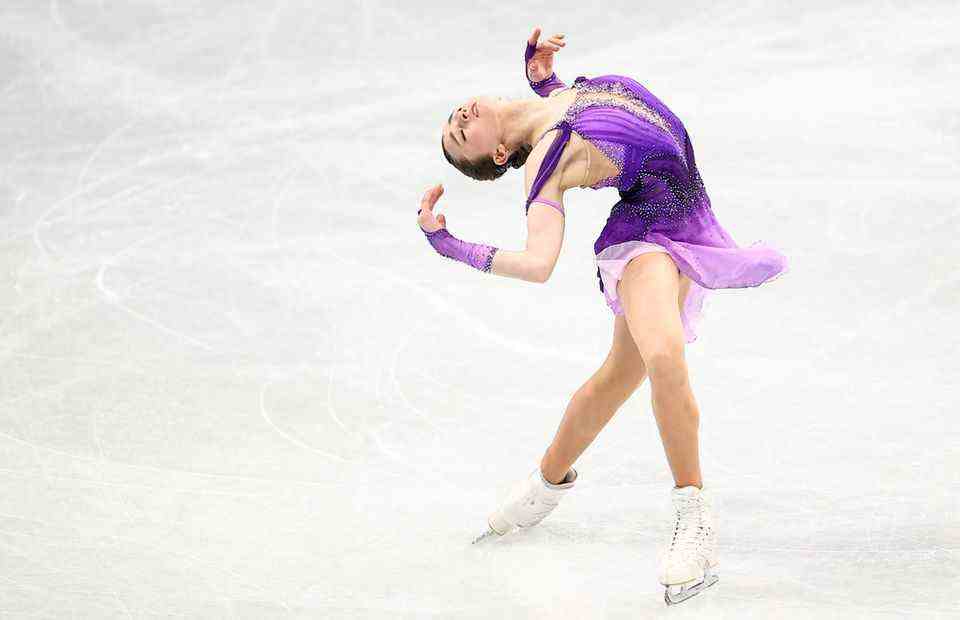Russian figure skating
Merciless: This is how Russian figure skaters are drilled for success
Eteri Tutberidze (right) with her protégé Kamila Valiewa in Beijing
© Anne-Christine Poujoulat / AFP
Kamila Valiyeva, the 15-year-old Russian figure skater, is the product of a system created by coach Eteri Tutberidze. Tough drill and apparently targeted doping of minors are the recipe for success.
The case of figure skater Kamila Valiyeva not only moves the Olympic world, but also highlights the handling and training methods in Russian figure skating. How can it even be that a 15-year-old was doped? What kind of system is behind it?
Valiewa won gold with the team in Beijing. A day later, it was announced that she had tested positive for the heart drug trimedazidine on December 25 during the Russian Figure Skating Championships. The Russian anti-doping agency Rusada suspended Valiyeva, only to reverse the decision a day later. On the other hand, the International Olympic Committee and the International Test Agency sued the International Court of Arbitration for Sport – and lost. Valiewa is allowed to compete in the individual competition and fight for gold.
The individual competition has been ridiculed
Beyond the dispute over doping a 15-year-old athlete, the individual figure skater competition will now be overshadowed by events. No one can predict whether Valiyeva will not be banned after all. The procedure is not complete. The competition is devalued, the competition understandably annoyed.
But when the young prodigy starts the short program on Tuesday, the Russian team will not care if the rest of the world looks at them with the greatest possible skepticism. On the contrary, it’s again: Russia against the rest of the world. Hopes are similar to the Pyeonchang 2018 Games, when Alina Zagitova and Yevgenia Medvedeva won gold and silver. Then as now, the name of the trainer who follows the freestyle of her protégés on the gang was Eteri Tutberidse. She is the maker of the Russian figure skating miracle – and highly controversial.
Rafael Arutyunyan, coach of Olympic champion Nathan Chen, compared the careers of Russian skaters to disposable coffee cups because they are short-lived. He didn’t mention Tutberidze’s name, it wasn’t necessary, everyone in the figure skating world knew who was meant.
As young as possible as quickly as possible to the top of the world
The Tutberidze system aims to lead young athletes to the top of the world as quickly as possible. The former figure skater, who never reached the highest level herself, is so successful that she receives the greatest possible support from the Russian state. Your students have been the Russian champions for seven years. Valiewa is the first woman to do two quadruple jumps at the Olympics. The limits of what is possible are constantly being expanded. This comes at a high price: the runners quickly reach their zenith and are then quickly gone.
Sagitova became world champion after her Olympic victory, then she took a year off because she could no longer motivate herself. She regularly lost to younger guys who showed quadruple jumps. She is currently dedicating herself to her TV career. Julia Lipniskaya, who played a large part in Russia’s team gold in 2014 and who brought Tutberidze to life as a coach, ended her career at the age of 19. She confessed to suffering from anorexia during her time as a figure skater. Kazakh runner Elisabet Tursynbaeva, who also trained with Tutberidze, retired after a series of injuries. Pyeongchang silver medalist Medvedewa joined Canadian coach Brian Orser. Among other things, she said that she wanted to work “with a trainer like a friend”.
The fact that 15-year-old Valiewa was convicted of doping was apparently a mistake in Tutberidze’s system. Observers assume that Valiewa may have discontinued the drug too late. It is preferably taken during training breaks because it shortens the regeneration phases. The Tutberidze system becomes even more suspicious thanks to team doctor Filipp Schwetsky. The man has a history of doping. In 2007 he supplied the Russian rowers with appropriate medication and was banned. Last fall, he suddenly appeared alongside Valiyeva, which even surprised the Russian media.
Kamila Valiewa is stylized as a heroine
In the Valiyeva case, the fact that a Russian athlete was caught is no less serious. As a reminder, Russian athletes are not allowed to compete under their national flag because their country has been found to have widespread state doping.
How different the perspectives are between many Russians and the rest of the world was made clear by the reactions after the Cas verdict. The Russian Olympic Committee, celebrities such as ice dancer Nikita Kazalapov and numerous media celebrated the preliminary decision in Valiyeva’s favour. She is even stylized as a victim of the West. Some media went so far as to claim that the West had even foisted the drug on Valiyeva, with bad intentions of course.
The World Anti-Doping Wada, on the other hand, sharply criticized the Cas’ decision. The decision is not in line with the Wada Code, which “does not allow specific exceptions to mandatory provisional suspensions for ‘protected persons’, including minors.” In its verdict, the Cas referred, among other things, to the fact that Valiewa was only 15 years old. In addition, many questions are unanswered, such as the excessively long examination time of the sample in the Stockholm laboratory. The Valiyeva case will continue.
Sources: DPA, “Associated Press”, “Southgerman newspaper”



